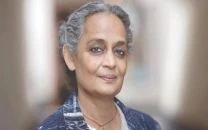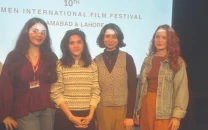SAAMPT: Film education 101
Dean of Saampt Daniyal Ali Khan talks about the rudiments of visual media.

With the Oscar coming home, around nine films already in the production and the trailer of Waar creating a stir, things seem to be finally picking pace for the Pakistani film industry. However in this new age of cinema, government and film institutions must also play an important role in imparting proper film education to potential film-makers because creative ventures can’t go far if they don’t have strong technological and financial backing.
Start from the scratch
“We need to halt the revival of cinema and start from scratch and that will only happen when the academia starts promoting this field,” says Daniyal Ali Khan, South Asian Academy of Motion Picture Arts and Television (SAAMPT).
Khan, who has been teaching film studies for around 10 years now, has been previously associated with Szabist’s Media Science department, Indus Valley School of Art and Architecture and National Academy of Performing Arts (Napa). He believes that the film departments in Pakistani universities need to follow the pattern of international film programmes to churn out well-informed film-makers.
“You can’t just offer a brief course on film and encourage the use of DSLRs and call it film education. Students should get hands-on experience on professional cameras and professional film formats such as 35 mm and 16 mm. Once the base is set, then may be later on in the course other formats can be introduced,” says Khan.
According to him, film should be introduced in the curriculum as a tool and technique. The dean, who was a film student himself at Columbia College Chicago, US, thinks that there is nothing wrong in buying camcorders and DSLRs as it helps in developing a student’s passion, however, craftsmanship and narrative finesse which comes from proper storyboarding and adept camera angles should not be overlooked. Khan believes that the most basic thing that decides whether a motion picture is good or bad is the crispness of storytelling. “Leave a camera with a monkey in a cage and he will find the button and eventually manage to capture something, but will it be a good film?”
Reaching dead end?
Khan believes that the aesthetic value of film shouldn’t be sacrificed at any cost and that is what the institutions need to keep their focus on, because apart from technique, it is the art of storytelling that matters. Drawing comparisons to the time when there were no institutions as such, Khan sees the emergence of new media schools and film departments as a beacon of hope, however what worries him is the teaching methodology and choice of faculty members.
He believes that no matter how experienced a certain industry professional is, if he is not educated in the field of film-making then, he shouldn’t be teaching film because what matters apart from knowledge and experience is the teaching methodology.
“The teacher should have a background in the relevant field that he or she is teaching. For example, you can’t get a graphic designer or a theatre major to teach film, you are being unjust to the craft itself,” says Khan.
The solution
Khan totally believes in the old adage ‘Jack of all trades, master of none’ and stresses that film and media schools should try to strengthen their students’ focus instead of stuffing too many irrelevant courses into the syllabus. “By specialising, I mean majors such as direction, scriptwriting, editing, cinematography and production should have regimented curriculum and one major should not overlap with the other because that just results in confusion and student learning courses that don’t help them later on.”
Khan also believes that Higher Education Commission (HEC) also has the most crucial role to play than anyone else. “HEC should build a committee comprising senior media practitioners and film-makers like Javed Jabbar to look after media and film education all over Pakistan. They should keep a check as to whether every institute is at par with the standard of the local industry,” he concludes.
Published in The Express Tribune, April 23rd, 2012.



















COMMENTS
Comments are moderated and generally will be posted if they are on-topic and not abusive.
For more information, please see our Comments FAQ